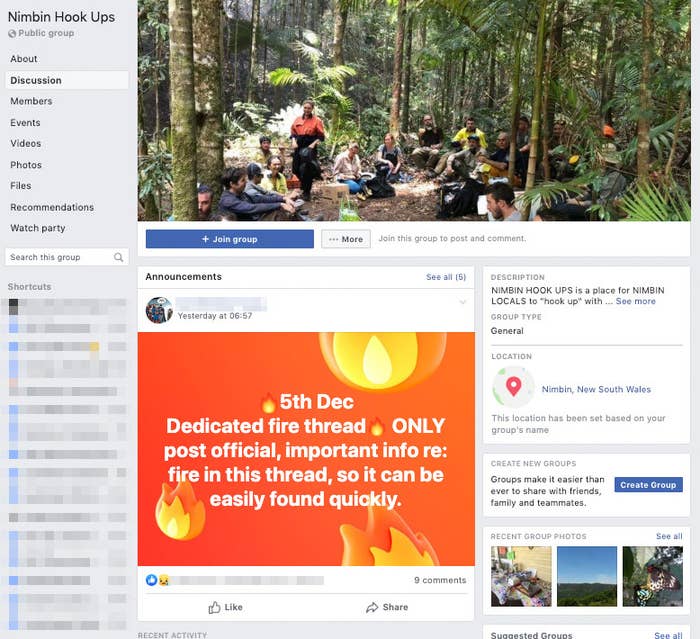
Amanda van Keimpema was exhausted. The resident of Canungra, a small rural town in Queensland, Australia, had been working 16-hour days for a week straight while bushfires raged nearby in late September this year.
She put her business on hold and dedicated her time to working with emergency services, the local paper, and community members to spread safety information. After danger to the area subsided, van Keimpema realised she was burnt out and began to recruit people to help her.
Based on her actions, you might assume van Keimpema is a volunteer coordinator, or perhaps a member of the local council. But she is in fact an admin of "Canungra (& surrounds) Community," a private Facebook group with more than 3,600 members from the vicinity.
While not unique to Facebook — companies like Nextdoor have built businesses out of geographically based social networks — the social media giant’s nearly 2.5 billion global monthly active users means such groups are most likely found there.
Local Facebook groups increasingly serve as a local area’s town square, classifieds section, Neighbourhood Watch, and emergency information centre all rolled into one. But, for the most part, they are run by volunteers who in 2019 are devoting huge chunks of time figuring out how to enforce rules, referee disputes, and avoid getting sued in the process.
Several admins who spoke to BuzzFeed News said they spend anywhere from a couple of hours a week to more than two hours a day running the communities. The time tends to spike when a natural emergency occurs in the area, and these events are increasingly regular in Australia.
“We’ve got water issues at the moment, which has caused a spike in engagement,” van Keimpema told BuzzFeed News. “There’s only 400 people in Canungra, but each time an environmental issue happens, we get lots of people trying to join the group.”
Tarang Bates is the founder of "Nimbin Hook Ups," a public Facebook group for the tiny NSW East Coast town known for its hippies and alternative lifestyles. Bates spends at least an hour each day moderating discussion and screening profiles trying to join.
Three of us were talking yesterday. Running the Epping Forest Neighbourhood Watch facebook group and twitter account could easily be a full time job, but we do it because we want our neighbourhood to be safe. That is what Neighbourhood Watch is all about, so why not join us?
“There are so many people want to join because of the recent bushfires,” Bates told BuzzFeed News. “It’s supposed to be a local group. There’s so many people trying to join saying ‘We’re moving here’ or ‘We’ve got a friend there’. It takes time to go on the profiles to sleuth where they actually live.”
Bates used to spend time breaking up fights and removing posts that violated the group’s rules, but developed a way of triaging work.
In the nine years since the group started, Bates has launched a network of spinoff groups — "Nimbin Hook Ups Discussion Group," "Nimbin Hook Ups Buy Sell & Barter," and "Nimbin Hook Ups — Trades & Services." All these groups require moderating as well, but they free up the main group for other posts she deems important.
I recently joined a neighbourhood Facebook group and it's been an absolute eye-opener in terms of how some people use the service.
Bec Connor is an admin of the coastal neighbourhood Facebook group "Stockton Community," which has nearly 3,800 members, and a former town planner with community consultation experience. She’s frustrated that Facebook doesn’t give more guidance on creating healthy communities, offering instead only technical instructions for using the group, and issuing some basic fundamental group rules.
“Facebook has kind of ‘be kind, courteous, and no hate speech’ rules,” Connor told BuzzFeed News. “But it’s really been trial by error. There’s no toolkit.”
Most community groups develop their own unique set of rules. Some, like “no abuse”, are pretty universal, but others can get extremely — even oddly — specific. In van Keimpema’s group, talking about people driving slowly is banned because it caused too many fights. Bates allows debates about “vaccine choice” (Mullumbimby, a town near Nimbin, has been nicknamed the anti-vaccination capital of Australia) but strictly only in the discussion group.
Seeing two idiots fight in the neighbourhood group on Facebook reminds me that I should really leave the neighbourhood group.
Of course, rules are not always followed. Each admin interviewed stressed they had faced abuse because of their position.
Some groups are tightly moderated; others are more laissez-faire. “If they’re being dickheads, then other people will pull them into line,” said Paul Mculcahy, admin of "Bendigo Have Your Say."
Unlike other online communities, in which members can be spread across the world, neighbourhood Facebook groups are concentrated in one place, making it a regular occurrence for online tension to spill over into the offline world. Admins told of group members frustrated with decisions boycotting their businesses, or even issuing threats to find them and physically assault them. One mentioned a Facebook group drama that had triggered conflict between children at school.
“There was one guy who was quite threatening after I kicked him out,” van Keimpema said. “He physically threatened me. He said, ‘I’ll see you at school’. When I saw him there later on, he didn’t even look at me.”
Fear of being sued is common among admins. The difference between an opinion and a potentially defamatory statement can be difficult to determine — particularly for people without legal training.
A huge number of bread-and-butter posts in these groups — gossip, alleged crimes, heated debates on local issues, and reviews of local businesses — walk this fine line. Most admins said they erred on the side of deleting posts they were concerned about.
Facebook groups add a new dimension to Neighbourhood Watch. Any member can raise alerts of crime and suspicious activity in their immediate areas and reach hundreds or even thousands of people in a matter of minutes.
None of the administrators said they’d been sued, and most said dissatisfied group members had at least raised their issues with them. They had also heard of legal disputes unfolding in other groups. “There was an incident where people were badmouthing the principal of a local school in a group for a nearby suburb, and now he’s suing,” said van Keimpema.
Now photographer is threatening to sue other local Facebook group for using her photograph #toofunny
Even when the lawyers aren’t called in, there are concerns about the quality of crowdsourced information in these groups, particularly at a time when local newspapers continue to shrink and disappear.
One group admin said they had a relationship with a local newspaper, and that the publication’s only journalist would “fact-check” the group by reporting any posts that contained incorrect information. Others admins said they would delete any posts making allegations that weren’t sourced. Some said they simply relied on the community to refute any posts that weren’t true.
So why…bother with all this? Admins unanimously said their motivation for running the groups was to benefit their community, citing the groups being an important source of information and a space to plan activities. And they believe it is worth the stress.
“I think it reflects the communities and conversations we have in Nimbin. People will often say, ‘I really like reading and seeing how everyone’s inter-relating,’” Bates said. “It’s a good thing for the community. I can’t imagine not having it there now.”
